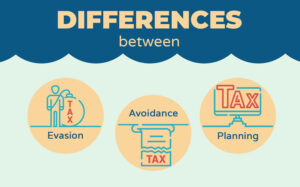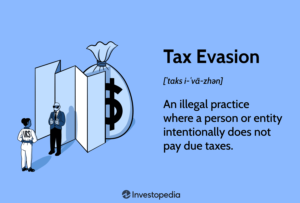
Tax Planning and Tax Evasion
Taxation Planning and Tax Evasion: Distinguishing Between Tax Planning and Tax Evasion:
Tax planning involves the legitimate process of strategizing and making financial decisions to minimize tax liabilities within the boundaries of tax laws and regulations. It aims to optimize tax outcomes by taking advantage of available tax incentives, deductions, credits, and exemptions.
Key characteristics of tax planning include:
Compliance with Tax Laws:
Tax planning operates within the legal framework of tax laws and regulations. It ensures adherence to tax requirements while seeking to minimize tax obligations through legal means.
Strategic Decision-Making:
Tax planning involves analyzing financial situations, evaluating tax implications, and making informed decisions to reduce tax liabilities. It focuses on maximizing tax benefits through lawful strategies and structures.
Transparency and Disclosure:
Tax planning activities are typically transparent and fully disclosed to tax authorities. Relevant information and supporting documentation are provided accurately and completely.
Tax Evasion:
Tax evasion refers to the illegal act of intentionally avoiding paying taxes by using fraudulent or deceitful means to misrepresent financial information to tax authorities. It involves deliberate efforts to conceal income, inflate expenses, or manipulate records to evade tax obligations.
Key characteristics of tax evasion include:
Illegal Activity:
Tax evasion involves deliberate actions to evade tax liabilities in violation of tax laws and regulations. It is a criminal offense punishable by law.
Deceptive Practices:
Tax evasion entails fraudulent and deceitful practices such as underreporting income, inflating deductions, hiding assets, or engaging in sham transactions to avoid taxes.
Non-Compliance and Non-Disclosure:
Tax evasion involves intentionally failing to meet tax obligations, including filing false tax returns, concealing income, or providing misleading information to tax authorities.
Penalties and Legal Consequences:
Tax evasion carries severe penalties, including fines, imprisonment, and reputational damage. It is vigorously pursued by tax authorities to uphold tax integrity and fairness.
It is essential to understand that tax planning aims to legally minimize tax liabilities, while tax evasion involves unlawful practices to evade tax obligations. Engaging in tax evasion is illegal and can result in severe consequences. It is advisable to seek professional tax advice and engage in legitimate tax planning to optimize tax outcomes while remaining compliant with tax laws.
To visit- https://www.incometax.gov.in
FAQs
1.What is tax evasion?
- Tax evasion is the illegal act of not paying taxes owed by hiding income, inflating deductions, or not reporting certain transactions.
2. Is tax planning legal?
- Yes, tax planning is legal and encouraged as it helps individuals and businesses optimize their tax responsibilities.
3. Is tax evasion legal?
- No, tax evasion is illegal and can result in severe penalties, including fines and imprisonment.
4. How do tax planning and tax evasion differ in intent?
- Tax planning is aimed at efficiency and compliance, while tax evasion involves deliberate deceit to avoid paying taxes.
5. Can tax planning lead to audits?
- While tax planning can attract scrutiny, as long as it’s legal and properly documented, it shouldn’t lead to issues. Tax evasion, however, often results in audits and legal consequences.
6. Are there consequences for tax planning?
- There are typically no negative consequences for tax planning as long as it complies with tax laws. Tax evasion leads to serious legal repercussions.
7. Can I consult a professional for tax planning?
- Yes, it’s advisable to consult tax professionals or accountants to develop effective tax planning strategies.
8. Do tax planning and tax evasion use the same strategies?
- No, tax planning uses legal strategies to minimize taxes, while tax evasion employs illegal tactics to hide or underreport income.
9. What should I do if I’m unsure about my tax strategies?
- If unsure, consult a qualified tax professional to ensure that your tax strategies are compliant and ethical.
